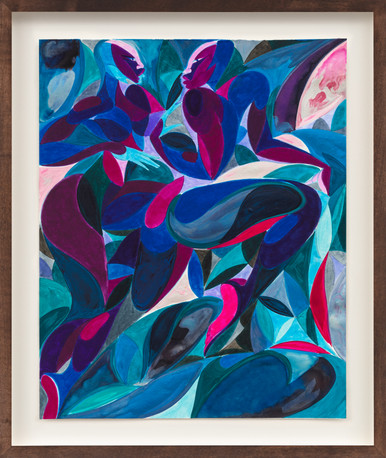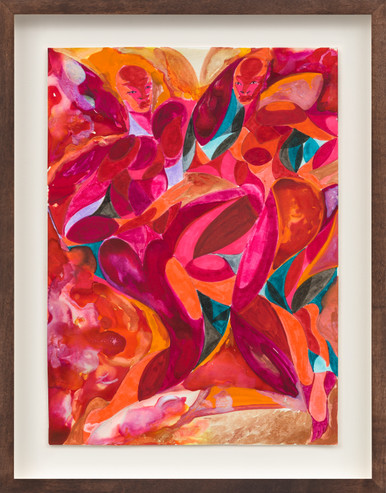TUNJI ADENIYI-JONES
SPOTLIGHT:
TUNJI ADENIYI-JONES
The New York-based, London-born artist is getting ready for the next phase of his life and career.
What makes a piece of art good?
It's the artist’s job to deliberate that in real-time and execute in practice. It’s the critical historian’s job to attempt to come up with inclusive answers. I’m working on a piece–I just moved into this new space–and I’ve been struggling with putting things together and I realize I haven't completed a work here yet. Emotionally, I have to break down that barrier and feel comfortable making work here. As I’m going through those motions, I’m telling myself, “This thing I’m making isn’t good,” just because it’s a new context. What makes an artwork good? I would say there’s an element of comfort and familiarity.
How important is the space where you work?
Hugely important. I think the correct or incorrect space can push you or pull you in different directions, but it will have an unassailable effect on how you work. This new studio I have is on a bit of a slant, so as I move I’m veering off to the side a bit, which affects everything I do. The space has a huge effect on how the work is perceived, how it’s made, how I live with the work and grow with the work.
Are you a planner or do you sort of improvise as you move along?
I’m a heavy-duty planner who’s trying to learn to improvise more. Sticky notes and reminders and calendar markers and things like that. I carry a sense of urgency and routine from my boarding school days when I was a teenager. I apply what was hammered into me in that stage of my life to the studio. Now, I’m loosening up a bit with those things.
Do you generally agree with the way people write or talk about your work?
I’ve found that I do sometimes agree with it, but I do think in a moment when we’re seeing such an incredible turnout of artists of color, I think my position as the non-American Black artist in America is particularly interesting. I think sometimes when people are trying to write about me and my work it does confuse that a tad. I’m not American, I’m not from here officially, but I do want it to be acknowledged sometimes that I am bringing different background elements to the work I’m making.
Do you ever feel pigeonholed by how people have that conversation?
I wouldn’t say pigeonholed because I don’t think there’s an attempt to fully grasp it. I’ve avoided being classified in certain ways because it’s not that straightforward. I had a painting acquired by PAMM [Pérez Art Museum Miami] and they in turn acquired some work by Kwame Brathwaite as well, so they changed the title of the collection to African and African American Diasporic Artists. Previously I think it was just African American Art. They made a distinction saying, “This encompasses the diaspora.” That was an acknowledgement of how I’d like to see things, which is always additive.
What do you listen to while you work?
I have particular tones and keys and progressions in music that I like. There are certain chord progressions that occur in everything from trap music to Afro beats. I was listening to Amy Winehouse the other day. It was a song where she sampled a song by Nas who also sampled Amy Winehouse. They worked with the same producer who worked with Jay-Z. I like to hone in on that–going to the producer or the composer and finding a recurring theme that will draw me in.
How does your mood affect the things you listen to?
I don’t try and go against my mood, which is a thing I’ve learned. If I wake up feeling a certain way, I feed it and keep going with it because I find that I can be really productive regardless of the mood. Where it might get confusing is if I try to counteract it and go, “Well, I’m feeling a bit lower today. Let me try to make myself feel a bit up.” And that doesn’t work as well for me. I find if I’m feeling a bit lower, I actually have a selection of music I listen to to sit in that space very comfortably and then just get on with my day and be quite effective.
Is there a hobby you love?
Music was one of the things I used to do and it had to fall by the wayside a little bit. I used to play the tuba. There was a certain point where I had to make a decision if I was going to go one way or the other, sort of the fine art route or serious musical training. Also, I exercise a lot, but I see that as a supplement to my studio practice to help me stay kind of grounded in and out of the studio.
Emotionally or in the physicality of your practice?
Both. If I get particularly frustrated, it’s easy to do some exercise and just clear my head a little bit. It offers time for reflection and a different level of exertion, which translates to sports. I have a weird personal theory that, especially in America, the major sports associations, franchises and leagues are synonymous with commercial art and music and Hollywood and everything. Having lived in this country for six-and-a-half years now, I’ve learned the most about American culture through sports.
How so?
It’s incredibly revealing because it’s driven by masses of public consumption. That means there are masses of consumers. It’s driven by financial revenue that is absurd. The athletes, the performers, the creators, the artists involved are similarly compensated, but also treated in such a way that you can get a measure of the temperature of what’s going on in this country by what’s happening in the NBA or the NFL. The positions young artists are put in are very similar to the positions young athletes are put in. The money involved in the franchises here is so large. And similarly, the art market is so large. I see it all working in a very similar way. The most successful artists, sometimes you’ll chalk it up to skill or luck and it’s the same with athletes. They don't get injured. Is that luck? I don’t know. You only have a certain number of stars and it seems to be predetermined. The same thing happens in the art world.
You went through Yale’s graduate program. Did being in an art school environment help form a lot of those thoughts about how things are predetermined?
Yes, 100 percent. I didn’t understand or know the history of that program until I moved here. It’s not a history that’s shared across the Atlantic the same way. Things became very organized and preordained in a way that I wasn’t sure about beforehand. That definitely adjusted my mindset about being a professional in this business.
How did it shift things?
I came to that program with a certain mentality, but that was shattered very quickly, in the most necessary way. I didn’t understand what it would mean to be an artist. For example, the first question you asked about a good artwork, perhaps I would have had an answer for that. I think I’m more invested in long-term answers now and thinking more deeply.
Are you superstitious about anything?
So many things! I believe in cosmic and karmic action and in the power of words and intentions. I get quite scared sometimes. I think having the thought is OK, but actually vocalizing things can be quite real. The reason I feel that way is I know in my life I’ve been quite fortunate, not in the conventional sense, but perhaps in the timing sense.
What do people notice most about you and your personality?
People say I’m very quiet. I guess the way that becomes a thing is because I’m also very present. I’ll be somewhere, but I won’t be loud about it. It’s an interesting distinction between not needing to be heard, but always wanting to have proximity. It’s something I inherit from my family on my father’s side. All the folks on that side of the family are quiet.
Do you have any habits you’re trying to break?
Several, like stress eating. And then in terms of the work, allowing more failure and mistakes to come in. I tend to want to overcorrect or over-perfect things. In relation to the work I'm showing on Platform, it’s a nice moment where I’m starting to use some watercolor and some ink, mediums which are slightly less in my control. Allowing control to ease up a bit and letting the work manifest on its own.
Is there something you’d want to start over again?
On my graduation from grad school, I don’t know whether it was food poisoning or I just had a crazy night before, but I was sick. Stevie Wonder came to get an honorary diploma and it was this big event and I was throwing up behind one of the colleges all day. I had family fly in from Nigeria, I had my parents fly in from London, I had family come in from DC. It was this big, “Come and celebrate this day with Tunji,” and I was sick all day. People flew in from Nigeria and I couldn’t even have lunch with them.
Were you able to get together with everyone the next day at least?
I was. And, of course, the ceremony still happened and I received my diploma and I was fine, but it was everything around that was a bit of a mess. That immediately comes to mind because it seems like a moment where perhaps there was something that was supposed to happen in a way and it just didn’t.
Is there anything you wished you were asked more often?
If it had to do with my work, it would be more of a question of my cross-cultural, hybridized experience. I think that’s a conversation that doesn't happen as often. It’s something I would want to talk about more, that sort of cultural addition, combination and collaboration rather than confrontation.



